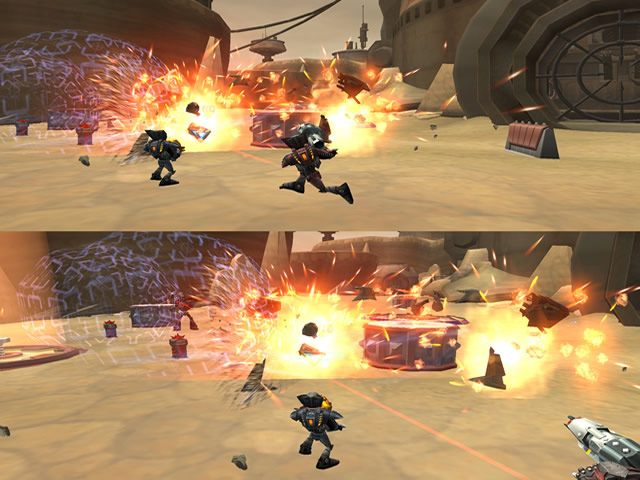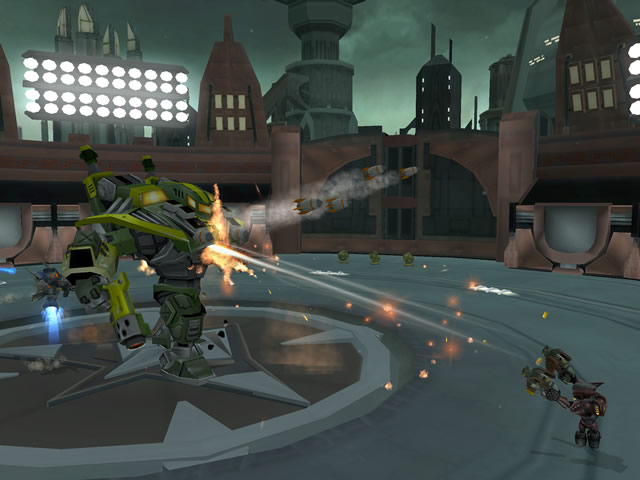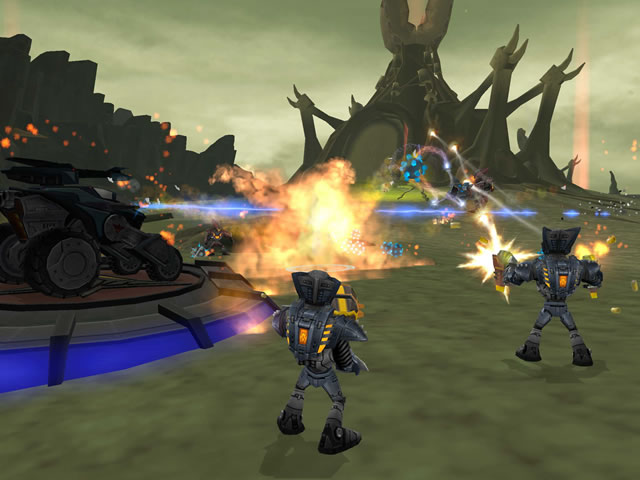One is the loneliest number.
If history has taught us anything, it’s that you shouldn’t mess with a great duo. Take Lennon and McCartney, Cheech and Chong or Cagney and Lacey. Now think of their solo careers. Lennon married an avante garde wacko and got shot while Paul grew Wings and lost his edge. Cheech orbited the B-movie circuit while Chong did what Chong do. And Cagney and Lacey? Okay, maybe all splits aren’t bad.
But it seems clear that when you’ve found a good one-two act, you should consider carefully before striking out alone. As the title suggests, the most recent incarnation of the Ratchet and Clank franchise, Ratchet: Deadlocked, has chosen to cut its losses and its android co-star. Is Ratchet alone enough to move the goods? Were the focus groups right in choosing fuzzy and cute over steely and smart?
Strangely, yes.
What’s funny – and much of this game is intentionally funny – is that the subplot of this game’s story deals with the marketing of children’s merchandise. The villain, a futuristic media mogul named Gleeman Vox, is pushing a sadistic gladiatorial game show called Dreadzone that’s a comedic cross between The Running Man and American Gladiators. Unlucky for Gleeman, his merchandise, action figures and lunch boxes are failing to sell because kids don’t like his “executioners.” In what may or may not have been clever irony, Clank sits this game out, apparently less popular with kids and gamers than his pal Ratchet. The world of commerce sheds no tears for losers. Without adieu, Ratchet is captured and forced to “volunteer” for the contest. Violence and mayhem ensue as Ratchet ratchets himself up the tournament bracket.
Sans Clank, the familiar gameplay has been streamlined for pure action. Ratchet fights his way through level after level, being taped by video cameras the whole time. The franchise has succeeded by way of its eminently usable, terrifically balanced armament and this game is no exception, supplying you with ten weapons and a variety of death-dealing gadgetry. Although many of the weapons seem more conventional than their earlier counterparts (variations on the machine-gun, the sniper rifle, the shotgun, etc.), they still level up with use and can be modified with add-ons to produce all kinds of neat effects. One, the “morph mod,” will randomly turn your targets into explosive barnyard animals that detonate your enemies. That’ll do, pig. That’ll do.
 The action is fast-paced and a lot of fun thanks to solid mechanics; moving Ratchet around and shooting things with guns is simple. Changing between weapons is a quick process, using a shoulder button to display a pop-up gun menu. The play stops as you select a gun, but when you’re in the middle of a blistering fight, you won’t spend a lot of time dilly-dallying.
The action is fast-paced and a lot of fun thanks to solid mechanics; moving Ratchet around and shooting things with guns is simple. Changing between weapons is a quick process, using a shoulder button to display a pop-up gun menu. The play stops as you select a gun, but when you’re in the middle of a blistering fight, you won’t spend a lot of time dilly-dallying.
That’s because the combat is as consistent as a high-fiber diet. With very few exceptions, the platform puzzles of the past are gone, replaced by more and more bad guys. The game manages to keep things from getting too repetitive, however, by frequently changing gears between basic shooting and vehicle challenges.
These usually involve racing to beat a clock or stomping around and blowing up enough objects. Out of the hovercraft, the landstalker, the hoverbike, and the puma, the landstalker is the most used and the most fun. Guided missiles make mincemeat of bad guys while spider-like legs traverse rocky ground easily.
But despite the expected smooth-as-silk action engine, the game doesn’t quite succeed in landstalking its way over every problem. For one, the missing Clank and the missing platforming are noticeable omissions, focus groups be damned. The game stays lively by limiting the length of missions to only five or six minutes. While keeping the missions short makes them addictive and fun in short bursts, the reality show theme leads to repetition and a sense that Ratchet is just grinding gears, never quite going anywhere, for all his running. There are only so many piggies one can smoke in five minutes. For that matter, the whole shebang is a bit short, though weapons are evolved with a single play-through and can be even more satisfying with another go-round.
 If that’s not your bag, you can enjoy the game’s robust multiplayer. A co-op mode is a great addition, as are the new types of online multiplayer games (King of the Hill, Juggernaut, Conquest) and the increased number of players allowed in a multiplayer match (ten).
If that’s not your bag, you can enjoy the game’s robust multiplayer. A co-op mode is a great addition, as are the new types of online multiplayer games (King of the Hill, Juggernaut, Conquest) and the increased number of players allowed in a multiplayer match (ten).
However, for all of the fun of the multiplayer battles, the menu system is obtuse. Although the game runs fast in all of its other modes, the time between online matches is made a chore. After each match, the host of the match recreates the match – wasting almost a minute of frag time. Even worse, many players leave during this down time, forcing everyone else to wait what seems like eons for new players to join. There’s a lot of unnecessary lobby-time in Ratchet: Deadlocked, and as we all know, virtual lobbies suck.
The sound doesn’t, though. The play-by-play and color commentary from game show host Dallas and his sadistic sidekick Juanita is filled with smart, witty one-liners, keeping the tone of the game satiric and fun even through the tough action bits. The cut scenes, in which many jabs are made at reality TV, children’s merchandising and a thinly veiled joke about “Vox News,” is game writing at its best. Ratchet: Deadlocked is a very funny game without having to resort to the usual unfunny bathroom humor.
So while the game doesn’t bring a lot of new to the table, it certainly removes some wind resistance and delivers another admirable volley of cartoonish violence. Plenty of solid action and good humor make up for its lack of adventure. Not bad for a first-time solo artist.
-
More big guns, more big shooting
-
Funny writing
-
Expanded multiplayer
-
That takes too long to load
-
Short missions, short game
-
R.I.P. Clank






